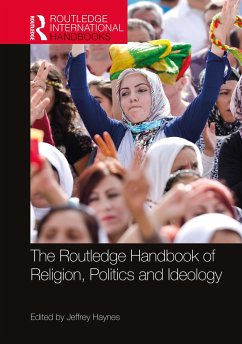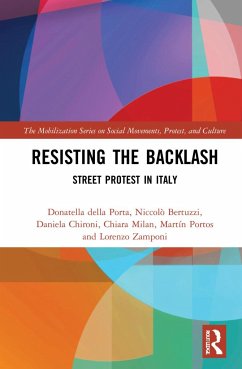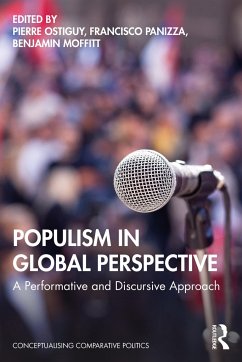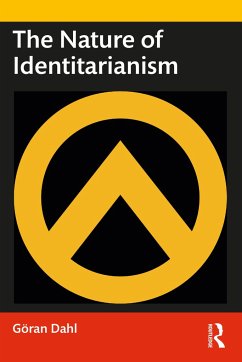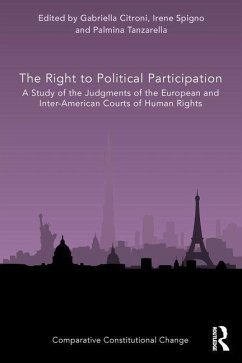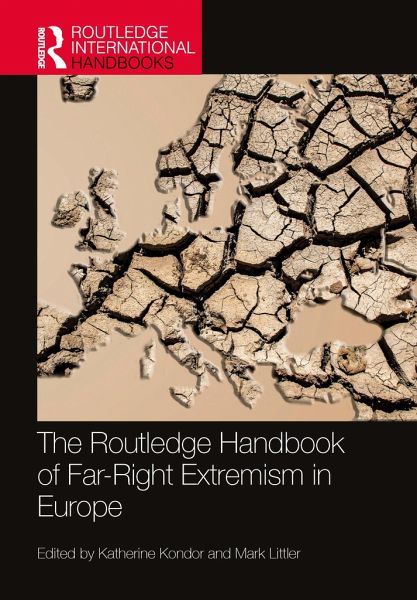
The Routledge Handbook of Far-Right Extremism in Europe
Versandkostenfrei!
Versandfertig in 6-10 Tagen
245,99 €
inkl. MwSt.
Weitere Ausgaben:

PAYBACK Punkte
123 °P sammeln!
The Routledge Handbook of Far-Right Extremism in Europe is a timely and important study of the far and extreme right-wing phenomenon across a broad spectrum of European countries, and in relation to a selected list of core areas and topics such as anti-gender, identitarian politics, hooliganism, and protest mobilisation.The handbook deals with the rise and the developments of far-right movements, parties, and organisations across diverse countries in Europe. Crucially, it discusses the main topics and issues pertaining to far-right ideology and positioning, and considers how central and less c...
The Routledge Handbook of Far-Right Extremism in Europe is a timely and important study of the far and extreme right-wing phenomenon across a broad spectrum of European countries, and in relation to a selected list of core areas and topics such as anti-gender, identitarian politics, hooliganism, and protest mobilisation.
The handbook deals with the rise and the developments of far-right movements, parties, and organisations across diverse countries in Europe. Crucially, it discusses the main topics and issues pertaining to far-right ideology and positioning, and considers how central and less central actors of far-right milieus have fared within the given context. Comprising a wide range of subject expertise, the contributors focus on far-right organisations on the margins of the electoral sphere, as well as street-level movements, and the relationship between them and electoral politics. The handbook spans nearly twenty European country cases, grouped according to geographical/regional area. It includes case studies where the far right has gained increased momentum, as well as countries where it has been much less successful in mobilising public opinion and the electorate (e.g. Ireland and Portugal). Another important feature is the inclusion of street-level mobilisations, such as football firms, thereby expanding and updating existing research, which is primarily focused on political parties and organisations.
Multidisciplinary and comprehensive, this handbook will be of great interest to scholars and students of Criminology, Political Science, Extremism Studies, European Studies, Media and Communication, and Sociology.
This project has received funding from the European Union's Horizon 2020 research and innovation programme under the Marie Sklodowska-Curie grant agreement No 101029801. Chapter 6 of this book is freely available as a downloadable Open Access PDF at http://www.taylorfrancis.com under a Creative Commons Attribution (CC-BY) 4.0 license.
The handbook deals with the rise and the developments of far-right movements, parties, and organisations across diverse countries in Europe. Crucially, it discusses the main topics and issues pertaining to far-right ideology and positioning, and considers how central and less central actors of far-right milieus have fared within the given context. Comprising a wide range of subject expertise, the contributors focus on far-right organisations on the margins of the electoral sphere, as well as street-level movements, and the relationship between them and electoral politics. The handbook spans nearly twenty European country cases, grouped according to geographical/regional area. It includes case studies where the far right has gained increased momentum, as well as countries where it has been much less successful in mobilising public opinion and the electorate (e.g. Ireland and Portugal). Another important feature is the inclusion of street-level mobilisations, such as football firms, thereby expanding and updating existing research, which is primarily focused on political parties and organisations.
Multidisciplinary and comprehensive, this handbook will be of great interest to scholars and students of Criminology, Political Science, Extremism Studies, European Studies, Media and Communication, and Sociology.
This project has received funding from the European Union's Horizon 2020 research and innovation programme under the Marie Sklodowska-Curie grant agreement No 101029801. Chapter 6 of this book is freely available as a downloadable Open Access PDF at http://www.taylorfrancis.com under a Creative Commons Attribution (CC-BY) 4.0 license.





